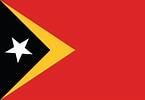UPDATE on TIMOR-LESTE
Why Timor-Leste?

Recently, I was reading and seeing information about the oil bonanza currently happening in Guyana and the challenges the country faces with using that oil money to good effect. Guyana also has to worry about highly disputed claims on its territory by neighboring Venezuela. In reading about oil and Guyana I recall two other countries where I worked that did not have oil and gas revenues until recently, these countries are Timor-Leste and Ghana. You might recall that I wrote about my work in Timor-Leste in Chapter 13 of my book – Overseas Adventures – From Afghanistan tom Zambia and Points In-Between. To update my information about these three countries I decided to do some research with a focus on oil and its impact on each state. Today’s post is about Timor-Leste.
An excellent source of information I found is a 2021 article by Charles Sheiner published in the Wiley Online Library.
In the article, Sheiner observes:
“Petroleum revenues have drastically declined, and other reserves will probably not produce revenues comparable to the US$20 billion already received. This heightens Timor-Leste’s major challenges: import dependency, unemployment, lack of economic diversification, poverty, inequality, inadequate public services and COVID-19.“
“Thousands of young Timorese go overseas to work, mostly in the United Kingdom but also in government-organized programs in Australia and South Korea. They send home about $100 million per year in remittances, a significant amount though a smaller fraction of GDP than in 57 other countries. Overseas workers acquire knowledge and work habits from their exposure to the larger world, while improving the living standards of their families. However, some people (including this author) believe that Timor-Leste would be better served if these workers came home after a few years and used their skills to develop Timor-Leste’s own society and economy, rather than just sending part of the wages they get for supporting overseas businesses. This would require them to create or find jobs… employment opportunities with private companies have been falling in recent years.”
One way the Government of Timor-Leste can support this initiative is to arrange for mutual recognition agreements for qualifications between the sending and recipient countries. Bangladesh and the European Union recently launched an initiative assisted by the International Labour Organization to facilitate legal migration of skilled workers to European countries with an assurance that workers have the skills in demand. Ensuring that new skills learned during work in destination countries are duly assessed and recognized through certification processes would be one way to help re-integrate workers back into their home country.
In a 2021 post-COVID economic development strategy, the T-L Government stated:
“For Timor-Leste to grow continuously in an inclusive and sustainable way, more and better ways must be found to strengthen its production capacity and diversify its economy outside the oil sector … [T]he message is simple: we must rely less on our natural resources and rely more on what we can produce with our own sweat, creativity and imagination, which would imply more resources devoted to tourism, agriculture and manufacturing.”
Sheiner fully agrees with this initiative and goes further to say:
“An essential first step is strengthening the country’s most precious resource—its people. Investing in nutrition, education and health care will lay the foundation for whatever paths are followed in the future. Although more than half of Timor-Leste’s petroleum-fuelled period has passed, a few years remain to prepare for the next phase of the country’s history.”
As described in my book chapter on Timor-Leste, I hope the apprenticeship system I piloted there in 2007 contributed in some way to strengthening the country’s people and their skill base.
Development Partners
There continues to be a United Nations presence in the country, one of the most important being the United Nations Development Programme (UNDP). For details on its activities, see this website:
Timor Leste | United Nations Development Programme (undp.org)
For vacancies available on various projects, see here:
https://unjobs.org/duty_stations/timor-leste
Australian Volunteers has a useful website that describes volunteering there.
Volunteer in Timor-Leste | The Australian Volunteers Program
The next post on my blog will look at Guyana.



